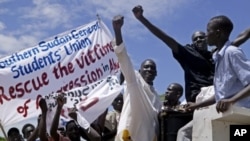United Nations peacekeepers in Sudan say the contested town of Abyei is being burned and looted two days after government troops seized control, forcing residents to flee. Our correspondent filed this report from the southern Sudanese capital, Juba, where he is traveling with the UN Security Council.
Demonstrators chanting “We’ll never, never give up Abyei” greeted a visiting delegation of Security Council ambassadors on Monday as they arrived in Juba for talks with South Sudanese leader Salva Kiir, who is due to become president of the newly independent nation of Southern Sudan on July 9.
High on the Security Council’s agenda for the talks was how to settle the status of Abyei - the oil-producing region at the heart of a north-south territorial dispute. Northern troops overran the town of Abyei on Saturday, driving out southern forces and prompting nearly all of its estimated 20,000 people to flee.
As the Security Council arrived, the U.N. mission in Sudan issued a statement condemning the looting and burning in Abyei. Spokesman Hua Jiang said the statement calls on the northern army to maintain law and order in areas under their control.
"For the second day running, there has been sporadic fighting and looting and burnings, and the United Nations has not been able to conduct its usual routine patrols," said Hua. "But from what we can see from the watching towers, we can see smoke coming from different quarters of the town and certainly gunshots heard all over the place."
The statement blames unspecified “armed elements” for the looting and burning. But the commander of the U.N. peacekeeping mission, General Moses Obi, said the only “armed elements” in Abyei after Saturday’s fighting are Sudanese government armed forces and allied militias.
"The town is right now abandoned; it is clear of civilian population," said Obi. "There was dotted burning of structures far and wide, there was presence of militia elements who obviously are moving alongside SAF [the Sudanese Armed Forces]"
After spending Sunday meeting with officials in Khartoum to hear the north’s side of the Abyei dispute, the Security Council spent Monday touring the south.
At the town of Wau, 26-year-old Abyei resident Julia Arual told U.S. Ambassador Susan Rice that her family was scattered when they fled Abyei two days earlier. They communicated through a translator.
ARUAL: "We don’t know where to take our children. They are killing us."
RICE: "Who’s killing you?"
ARUAL: "The northern Sudanese are killing them. What is the international community going to do about this situation?"
RICE: "We are working on helping to resolve the conflict in Abyei. We were in Khartoum yesterday, we will be in Juba this afternoon and we’re very focused on Abyei."
U.N. Security Council members met with chiefs of the Dinka tribes who live in and around Abyei. Paramount Dinka chief Kuol Deng says he told the ambassadors that the United Nations must act because it is the only entity with the authority to protect people in conflict zones.
"People are being killed," said Deng. "Everything is burning and we want this thing to be stopped. We want also there should be disarmament. Let us make it an area guarded by the Security Council. They should bring in international troops."
Security Council members say they are considering ways of establishing a new peacekeeping operation that would take over from the U.N. Mission in Sudan when its mandate expires on July 9 - the day the south becomes independent. One ambassador speaking privately said the council might defer to a proposed solution being drafted by the African Union’s point man on Sudan, former South African President Thabo Mbeki.
UN Sudan Mission Condemns Looting in Abyei




